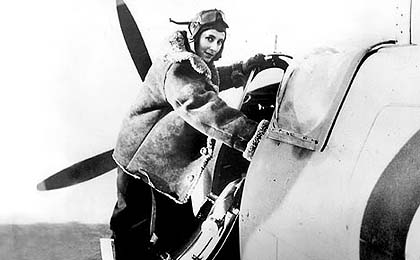Code Name Verity
by Elizabeth Wein
"I am a coward," admits the narrator in the very first line of Wein's (The Winter Prince) extraordinary novel. It's the opening to her written confession for her Nazi captors. Verity, the narrator-prisoner's code name, is a Scot working for the allies. She was captured when her plane went down in France, where she's being held by SS-Hauptsturmführer von Linden. But her small acts of rebellion as recorded by her own hand betray her bravery. For instance, she taunts the Nazi officer who turns his back after he returns her clothes one piece at a time, from "the outside in," in exchange for the Allies' codes, so she must undress each time she receives a new item; she tells him he's "missing a good show." She's often punished for her sassy commentary, which wins us over immediately. "I am in the Special Operations Executive because I can speak French and German and am good at making up stories," she writes, "and I am a prisoner in the Ormaie Gestapo HQ because I have no sense of direction whatsoever."
Fräulein Engel translates the written account from English to German for von Linden, and SS-Scharführer Etienne Thibaut metes out Verity's punishments for various transgressions. Verity calls them "Laurel and Hardy," and believes von Linden hopes she'll "do some ratting" on them ("He does not trust Thibaut because Thibaut is French, and he does not trust Engel because Engel is a woman"). Thus Verity amuses herself.
Most of Verity's account, however, weaves in episodes from a friendship between pilot Maddie Brodatt and Queenie, a Scottish wireless operator for the Allies who speaks French and German as well as her native English. At one point, fairly early on, von Linden points out to Fräulein Engel, by way of insult, that she has failed to recognize that "the English Flight Officer has studied the craft of the novel. She is making use of suspense and foreshadowing." To which Verity--whom we now know is Queenie--replies, "I am not English, you ignorant Jerry bastard, I am a SCOT." This friendship, forged when Queenie and Maddie teamed up to bring down a German-speaking pilot safely on an English landing strip, sustains Verity throughout her imprisonment.
Verity's account of her friendship with Maddie--the framework for her delivery of the "codes"--also serves as a record of the small moments of pleasure during wartime. The young women cement their friendship when they are forced to take shelter during an air raid, shortly after they've brought in the German pilot. Maddie takes Queenie on a bike ride to try and teach her navigational skills, and they wind up at a farmhouse where a generous family feeds them their first good meal in three months. When Maddie has a free shift, she opts for a train ride rather than sleeping on the base and winds up in Queenie's hometown. The stationmaster recognizes Maddie as a soldier (by her boots) and points her to Queenie's castle, where she meets Queenie's brother, Jamie, and the foster children ("Lost Boys") they've taken in during the war. The author keeps us mindful of how difficult it was to come by clothes, footwear and food. The scene of the Lost Boys, along with Jamie and Maddie, savoring an egg each is enough to make one hungry ("the hot, bright yolk was like a summer sun breaking through cloud, the first daffodil in the snow, a gold sovereign wrapped in a white silk handkerchief"). And Maddie's always saving up for her next chocolate bar.
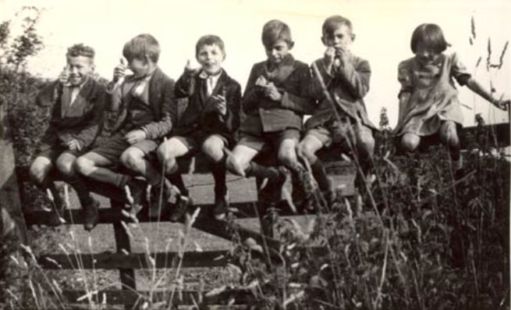
Literary and historical allusions pepper the dialogue. During a second air raid, after Maddie and Queenie shoot down an enemy plane, Queenie can't find her way through the smoke to the air raid shelter, and Maddie tells her, "Straight line across the grass.... Like finding Neverland, 'Second to the right and then straight on till morning.' " To which Queenie replies with Nelson's purported last words at the Battle of Trafalgar: "Kiss me, Hardy!" Verity here sums up one of the novel's central themes: "It's like being in love, discovering your best friend," she writes. Especially for Maddie and Queenie, who spend so much of the war working solo.
One of the author's great achievements is her ability to impart technical information while making it comprehensible--Verity wants us to be co-conspirators, so she leads us along with her. Wein also proves again and again that each character in these pages has a complexity that may at first elude us. Even von Linden can be vulnerable at times. As Wein weaves in layers upon layers of details, the ground shifts with each revelation. Like Megan Whalen Turner, Wein creates a captive who uses wit as a weapon, and makes us feel that, at least intellectually, Verity has the upper hand.
You will finish this novel and feel two competing urges: you'll want to start this book over at the beginning to see how Wein laid the foundation for her later unveilings, and you will also want to hand it immediately to a friend, and urge him or her to read it as quickly as possible, so you can talk about it. Wein's work is mesmerizing. --Jennifer M. Brown




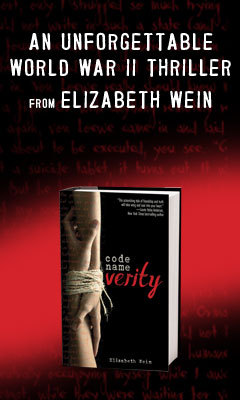
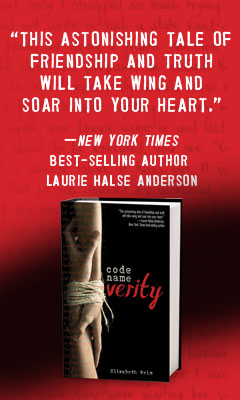
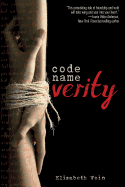

 After Elizabeth Wein wrote a story called "Something Worth Doing" for the anthology Firebirds Soaring, in which a girl disguises herself as her pilot brother, her editor asked if she'd write something longer. Wein was "casting about" for ideas when she read The Guernsey Literary and Potato Peel Pie Society for her book group. "I loved the Elizabeth McKenna character," the author said. "But I thought, 'This character is too heroic. I'll never be able to live up to this ideal.' " Wein got the idea to create someone cowardly, someone who's confessing--someone who would tell the story of her friend the pilot. "The plot kept surprising me," Wein said. We're betting it will surprise readers, too.
After Elizabeth Wein wrote a story called "Something Worth Doing" for the anthology Firebirds Soaring, in which a girl disguises herself as her pilot brother, her editor asked if she'd write something longer. Wein was "casting about" for ideas when she read The Guernsey Literary and Potato Peel Pie Society for her book group. "I loved the Elizabeth McKenna character," the author said. "But I thought, 'This character is too heroic. I'll never be able to live up to this ideal.' " Wein got the idea to create someone cowardly, someone who's confessing--someone who would tell the story of her friend the pilot. "The plot kept surprising me," Wein said. We're betting it will surprise readers, too.